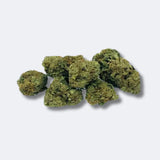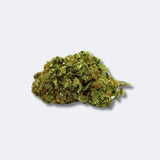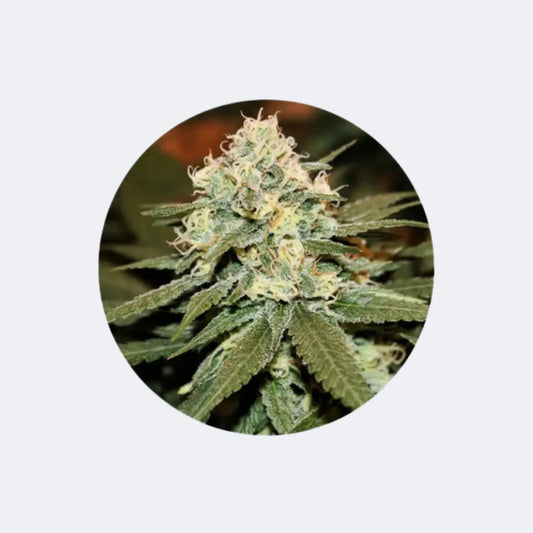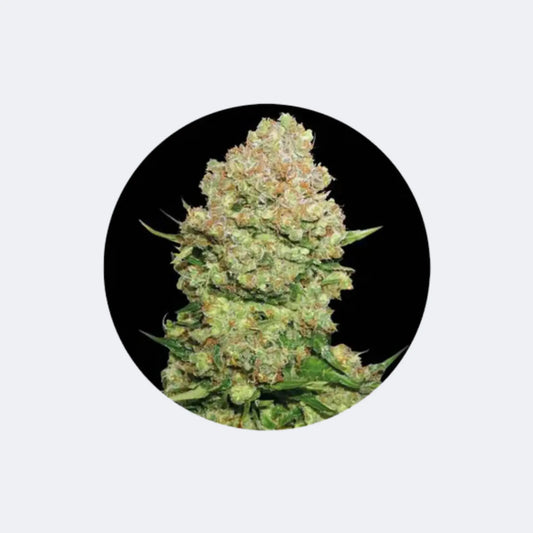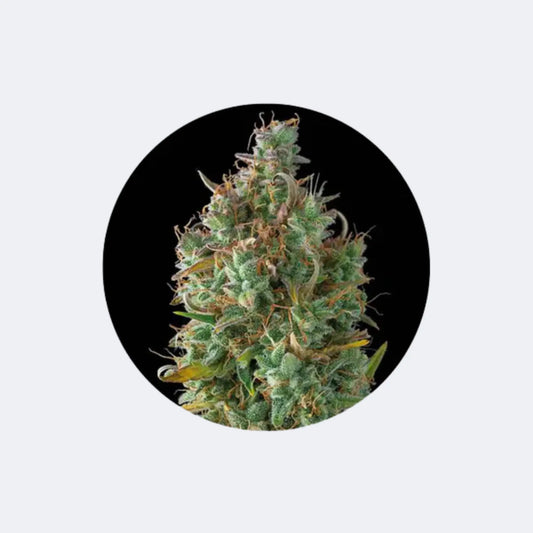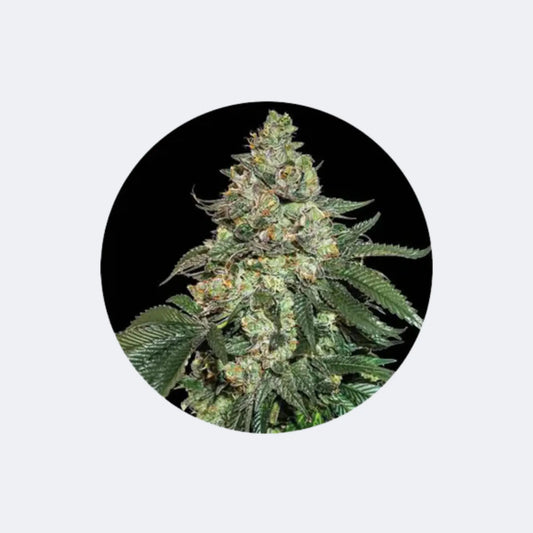
Relieve sleep disorders with CBD
Andreas LeschkeShare blog post
Sleep better with CBD: Your questions about CBD flowers, THC and CBD vapes answered
Description: Learn how CBD can help with sleep disorders and which CBD product is best for you in our comprehensive blog post. We explore the ideal time to take CBD oil before bed, compare melatonin and CBD, and explain how long it takes for CBD to take effect. If you're looking for a natural solution to your sleep problems, this article is for you!
Introduction
- Introduction to CBD and sleep disorders
- The importance of good sleep for health
- Preview of the topics covered in the blog post
Can CBD help with sleep disorders?
The effect of CBD on sleep
- Explanation of how CBD works in relation to the sleep-wake cycle
- How CBD can affect sleep disorders
- Examples from scientific studies on the effectiveness of CBD for sleep problems
Which CBD for sleep disorders?
- Differences between CBD flowers, THC and CBD vapes
- Which CBD product is best suited depending on the type of sleep disorder
- Dosage recommendations and instructions for use
When should you take CBD oil to sleep?
- The optimal time to take CBD oil before bedtime
- Consideration of individual sleep rhythm
- Tips for effective use of CBD to improve sleep
Which is better: melatonin or CBD?
Melatonin: Function and Application
- The role of melatonin in the body's sleep-wake rhythm
- Availability of melatonin preparations and their use
- Advantages and disadvantages of using melatonin
CBD vs. Melatonin: A Comparison
- Differences in the effects of CBD and melatonin
- Which substance might be more suitable for certain sleep problems?
- Personal preferences and individual needs when choosing between CBD and melatonin
The combination of CBD and melatonin
- Potential benefits of using CBD and melatonin together
- Safety considerations and dosage instructions for the combination
- Experiences of people who have used both substances to improve sleep
How long does it take for CBD to work?
Bioavailability and absorption of CBD
- How the body absorbs and processes CBD
- Factors that can influence the bioavailability of CBD
- Differences in the duration of action of different CBD products
Individual reaction times to CBD
- Why the effects of CBD can vary between people
- Patience when taking CBD and realistic expectations
- Adjustment of dosage based on individual response
Tips to accelerate the CBD effect
- Methods to shorten the time until CBD takes effect
- Combining CBD with proven sleep hygiene practices
- Dealing with situations where CBD does not work immediately
Conclusion
- Summary of the main findings of the blog post
- Recommendations for the use of CBD for sleep disorders
- An outlook on future developments and research in the field of CBD and sleep
This outline will serve as a structure for the blog post and allow for comprehensive coverage of the questions asked about CBD flowers, THC and CBD vapes in relation to sleep disorders.
Hey there! Sleep is one of the most precious resources for our well-being, but unfortunately, many of us suffer from sleep disorders. This is where cannabidiol, or CBD for short, comes in. In this blog post, we'll delve into the world of CBD flowers, THC, and CBD vapes to find out how they can help us with our sleep problems.
We know how important good sleep is, so we'll not only discuss whether CBD can help with sleep disorders, but also which CBD product is best for you. And hey, we'll also answer the big question: Melatonin or CBD – which is better?
But that's not all! We'll also discuss the best time to take CBD oil before bed, how long it takes for CBD to take effect, and how it can affect your psyche. Be careful, though, CBD isn't suitable for everyone, so we'll also provide information on who should avoid it.
Ready to dive into the world of CBD and better sleep with us? Let's get started together!
Can CBD help with sleep disorders?
Sleep disorders can significantly impact daily life, but CBD may offer a solution. Let's take a closer look at how CBD can help with sleep problems:
The effect of CBD on sleep
- CBD and the endocannabinoid system: CBD interacts with our body's endocannabinoid system, which plays a key role in regulating sleep.
- Reducing anxiety and stress: CBD has anti-anxiety properties that can help relieve stress-related sleep disturbances.
- Improve sleep quality: Studies suggest that CBD can improve sleep quality and extend sleep time.
Which CBD for sleep disorders?
- CBD flowers: These contain the full spectrum of cannabinoids and offer a natural and effective option to support sleep.
- THC: In some cases, THC, another cannabinoid, can aid sleep, but it should be used with caution as it can have psychoactive effects.
- CBD Vapes: Vaping allows for rapid absorption of CBD and could be useful for acute sleep problems.
When should you take CBD oil to sleep?
- Before bedtime: Many people take CBD oil about 30 minutes before bedtime for optimal results.
- Consider your own sleep rhythm: Your individual sleep rhythm and sleeping habits play a role in determining the best time to take CBD oil.
- Tips for effective use: We will also give you some tips on how to best use CBD oil for better sleep.
CBD has the potential to alleviate sleep problems, but proper dosage and application are crucial. Next, let's look at how CBD compares to melatonin.
Which is better: melatonin or CBD?
When it comes to managing sleep problems, many options are available. A frequently asked question is whether melatonin or CBD is the better choice. Let's take a closer look at these two approaches:
Melatonin: Function and Application
- The role of melatonin: Melatonin is a naturally occurring hormone that plays a key role in our sleep-wake cycle. It is normally produced at night to induce sleep.
- Availability of melatonin supplements: Melatonin supplements are available over the counter and are often marketed as sleep aids.
- Pros and Cons of Using Melatonin: We will discuss the pros and cons of using melatonin to improve sleep.
CBD vs. Melatonin: A Comparison
- Differences in mode of action: CBD and melatonin work in different ways. While melatonin regulates the natural sleep-wake cycle, CBD influences the endocannabinoid system and reduces stress and anxiety, which can lead to better sleep.
- Which substance might be better suited for specific sleep problems? We'll discuss the specific applications of CBD and melatonin.
- Personal preferences and individual needs: Your personal preferences and needs play a role in choosing between melatonin and CBD.
The combination of CBD and melatonin
- Potential benefits of simultaneous use: Some people choose to take both CBD and melatonin to improve their sleep. We'll discuss the potential benefits of this combination.
- Safety considerations and dosage instructions: The simultaneous use of CBD and melatonin requires certain safety considerations and dosage recommendations.
- Experiences of people who have used both substances: We will also share experiences of people who have successfully combined CBD and melatonin to improve their sleep quality.
The decision between melatonin and CBD depends on several factors, and there's no "one size fits all" solution. Let's now discuss how long it takes for CBD to take effect.
How long does it take for CBD to work?
If you're considering using CBD to improve your sleep, it's important to understand how long it may take for the effects to kick in. This can vary from person to person, but here are some key aspects to consider:
Bioavailability and absorption of CBD
CBD bioavailability refers to how well and how quickly your body absorbs and utilizes CBD. Here are some factors that can affect CBD bioavailability:
- Method of administration: The way you take CBD can affect absorption. For example, taking CBD oil sublingually may produce a faster effect than swallowing CBD capsules.
- Empty stomach vs. full stomach: An empty stomach can speed up the absorption of CBD because it can enter the bloodstream more quickly.
- Type of CBD product: Full-spectrum CBD products can have a stronger and faster effect due to the entourage effect.
Individual reaction times to CBD
The time it takes for CBD to take effect can vary from person to person. Individual factors play a role:
- Body mass: Body mass can influence the required CBD dosage. Larger individuals may require more CBD to achieve the desired effects.
- Metabolism: A fast metabolism can cause CBD to be broken down more quickly, while a slow metabolism can prolong the effects.
- Health status: Health status and individual differences in the endocannabinoid system can influence response time to CBD.
Tips to accelerate the CBD effect
If you want to speed up the effects of CBD, here are some tips:
- Sublingual intake: Taking CBD oil sublingually (under your tongue) can result in faster absorption.
- Empty stomach: Try taking CBD on an empty stomach to speed up absorption.
- Dosage: Consider a slightly higher dosage if you don't feel an immediate effect, but be careful not to exceed the recommended dosage.
- Consistency: CBD can have a cumulative effect over time. Regular use can help improve sleep quality in the long term.
Remember that patience is key when it comes to CBD. Optimal effects can take several days to weeks as your body adjusts to the compound. Experiment carefully to achieve the best results for your sleep.
Conclusion
Summary of the main findings of the blog post
In this blog post, we've taken a close look at the role of CBD, THC, and CBD vapes in managing sleep disorders. Here are the key findings:
- CBD can help with sleep disorders by affecting the endocannabinoid system, reducing stress and improving sleep quality.
- There are different types of CBD products, including CBD flowers, THC, and CBD vapes, which can be selected depending on the type of sleep disorder and personal preferences.
- The timing of taking CBD oil before bedtime can be crucial to achieving the best effect.
- Compared to melatonin, CBD offers an alternative approach to sleep problems that can be tailored to individual needs.
- The time it takes for CBD to work varies from person to person and depends on factors such as the method of administration and individual reactions.
Recommendations for the use of CBD for sleep disorders
If you are considering CBD to manage sleep problems, here are some recommendations:
- Consult a doctor or professional before taking CBD, especially if you are already taking medication or have health concerns.
- Experiment with different CBD products and dosages to find the optimal solution for you.
- Pay attention to the quality and origin of your CBD product to ensure it meets the highest standards.
- Keep in mind that CBD may not be an instant solution and patience may be required to feel the full effects.
An outlook on future developments and research in the field of CBD and sleep
The world of CBD research never stands still, and there are promising developments in the field of sleep medicine. In the future, we may gain even more detailed insights into how CBD affects sleep and develop more specific recommendations for specific sleep disorders.
We hope this blog post has helped you better understand the world of CBD and sleep and that you can use the information to improve your sleep. Keep in mind that individual needs can vary, and it's important to explore the best approaches for you personally. Good sleep is key to a healthy and fulfilling life, and CBD can be a valuable tool along the way.
